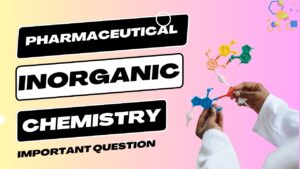Pharmaceutical Inorganic Chemistry Important Questions B. Pharma 1st Semester

Pharmaceutical Inorganic Chemistry Important Questions Unit 1
1. Can you explain the history of pharmacopeia and its significance in the pharmaceutical industry?
2. What are the sources and types of impurities in pharmaceutical substances? How are these impurities controlled during the manufacturing process?
3. Describe the principle involved in the limit test for chloride, sulfate, iron, arsenic, lead, and heavy metals in pharmaceutical substances.
4. Explain the modified limit test for chloride and sulfate and its importance in the pharmaceutical industry.
5. What are the general methods of preparation of inorganic compounds? Explain the assay for compounds that are superscripted with an asterisk (*). (in syllabus)
6. Describe the properties and medicinal uses of inorganic compounds belonging to the following classes:
a. Alkali metals
b. Alkaline earth metals
c. Transition metals
d. Rare earth metals
e. Non-metals
f. Halogens
g. Noble gases.
Pharmaceutical Inorganic Chemistry Important Questions Unit 2
1. Explain the concept of buffer capacity and how it relates to the buffering capacity of pharmaceutical systems. Give examples of buffer solutions used in pharmaceuticals.
2. What are isotonic solutions and why are they important in pharmacy? Discuss the methods of adjusting isotonicity and how tonicity is measured.
3. Describe the functions of major physiological ions in the body. Explain the use of electrolytes in replacement therapy and give examples of common electrolytes used in pharmaceuticals.
4. What are dental products and how are they used in dental care? Discuss the role of fluoride in the treatment of dental caries and the use of desensitizing agents.
5. Define acids and bases and explain their properties. Discuss the importance of buffers in maintaining acid-base balance in the body.
6. What is Calcium carbonate and how is it used in dental care? Describe the properties and medicinal uses of Sodium fluoride and Zinc eugenol cement.
7. Discuss the principle involved in the limit test for Chloride, Sulphate, Iron, Arsenic, Lead and Heavy metals. Explain the modified limit test for Chloride and Sulphate.
Pharmaceutical Inorganic Chemistry Important Questions Unit 3
Acidifiers:
• What are the uses of Ammonium chloride and Dil. HCl in the treatment of gastrointestinal disorders?
• How do Ammonium chloride and Dil. HCl work as acidifiers in the stomach?
• What are the possible side effects of using Ammonium chloride and Dil. HCl as acidifiers?
Antacids:
• What are the ideal properties of antacids for the treatment of gastrointestinal disorders?
• How do combinations of antacids work to relieve symptoms of acid reflux and heartburn?
• What are the differences between Sodium Bicarbonate, Aluminum hydroxide gel, and Magnesium hydroxide mixture as antacids?
• What are the possible side effects of using antacids?
Cathartics:
• How do Magnesium sulphate, Sodium orthophosphate, Kaolin and Bentonite work as cathartics?
• What are the recommended doses for these cathartics?
• What are the possible side effects of using cathartics?
Antimicrobials:
• What are the mechanisms of action of antimicrobial agents in the treatment of gastrointestinal infections?
• What are the different classifications of antimicrobials?
• How does Potassium permanganate, Boric acid, Hydrogen peroxide, Chlorinated lime, and Iodine and its preparations work as antimicrobial agents?
• What are the possible side effects of using antimicrobial agents?
Pharmaceutical Inorganic Chemistry Important Questions Unit 4
Expectorants:
• What are the uses of Potassium iodide and Ammonium chloride in the treatment of respiratory disorders?
• How do Potassium iodide and Ammonium chloride work as expectorants?
• What are the possible side effects of using Potassium iodide and Ammonium chloride as expectorants?
Emetics:
• What are the uses of Copper sulphate and Sodium potassium tartrate as emetics?
• How do Copper sulphate and Sodium potassium tartrate work as emetics?
• What are the recommended doses for these emetics?
• What are the possible side effects of using Copper sulphate and Sodium potassium tartrate as emetics?
Hematinics:
• What are the uses of Ferrous sulphate and Ferrous gluconate in the treatment of anemia?
• How do Ferrous sulphate and Ferrous gluconate work as hematinics?
• What are the recommended doses for these hematinics?
• What are the possible side effects of using Ferrous sulphate and Ferrous gluconate as hematinics?
Poison and Antidote:
• What are the uses of Sodium thiosulphate, Activated charcoal, and Sodium nitrite as antidotes for poisoning?
• How do Sodium thiosulphate, Activated charcoal, and Sodium nitrite work as antidotes?
• What are the recommended doses for these antidotes?
• What are the possible side effects of using these antidotes?
Astringents:
• What are the uses of Zinc Sulphate and Potash Alum as astringents?
• How do Zinc Sulphate and Potash Alum work as astringents?
• What are the recommended doses for these astringents?
• What are the possible side effects of using Zinc Sulphate and Potash Alum as astringents?
Pharmaceutical Inorganic Chemistry Important Questions Unit 5
Radioactivity:
• What is radioactivity and how is it measured?
• What are the different types of radioactive emissions (α, β, and γ), and how do they differ in terms of properties and biological effects?
• How is the half-life of a radioactive substance defined and measured?
Radioisotopes:
• What are radioisotopes and how are they produced?
• What are the properties and uses of radioisotopes in pharmaceuticals?
• How do radioisotopes interact with biological systems?
Sodium Iodide I131
• What is Sodium Iodide I131 and how is it used in nuclear medicine?
• What are the storage conditions and precautions needed for handling Sodium Iodide I131?
• What are the pharmaceutical applications of Sodium Iodide I131?
Radiopharmaceuticals:
• What are radiopharmaceuticals and how are they used in nuclear medicine?
• What are the different types of radiopharmaceuticals and how are they classified?
• What are the precautions needed for handling and administering radiopharmaceuticals?
• What are the potential risks associated with the use of radiopharmaceuticals and how can they be minimized?
Also, Visit: B. Pharma Important Question